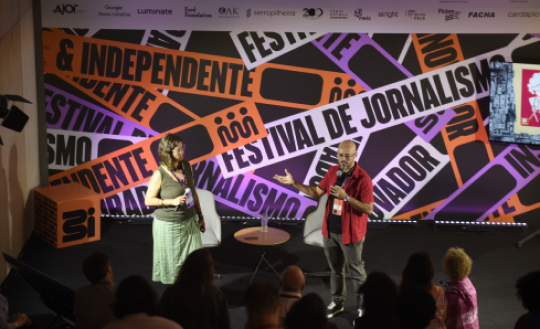Pitching a business venture for funding is an inherently arduous task. It is highly competitive, it requires a balance between what the business needs and what the investor wants and, most importantly, it requires succinct communication. Things get further complicated when the venture you’re seeking funding for is an independent media project. How do you pitch an independent media company for funding? What are the industry specific things to keep in mind when making a pitch?
MDIF’s Managing Director for Media Advisory Services Patricia Torres Burd and Program Director for Latin America Ana Soffietto were invited by Ajor, the Digital Journalism Association in Brazil to answer these questions through two sessions under the title “How to pitch my Project?” at the 3i Festival in Rio de Janeiro.
Held between June 13-15 this year, the 3i Festival celebrates “innovative, inspiring and independent journalism”, bringing together journalists, students, media outlets and media development organizations. Across two workshops, Patricia and Ana spoke about what a pitch is, what differentiates donations from investments, how to prepare for a presentation and presented a checklist for an efficient pitch. Here is the checklist for any media outlet looking to present a funding pitch at any point in the future:
- Present the problem you are trying to solve
- Explain who the audience is
- Detail the product
- Show how you reach or intend to reach the audience
- Highlight metrics – ability to engage the audience or generate impact
- Advocate why your organization should be chosen
- Present the business model and revenue sources
- Detail what you need
- Explain the business plan – how the money will help the organization grow
- Show costs
With 20 independent media participants in attendance for the first workshop, attendees engaged in a role-playing activity where they presented a mock pitch based on the checklist, while other participants role-played as investors and asked questions.
In the second session, 10 chosen media participants got the opportunity to present their pitch to a jury including Rosental Alves from the Knight Center for Journalism in the Americas, Nathaly Diaz from Internews, Vitor Conceição CEO of Canal Meio, and Patrician and Ana. The session ended with the jury offering detailed feedback on the pitch.
Describing the impact of these sessions, Maia Fortes, Ajor’s Executive Director, said: “The pitch sessions were a very valuable experience for Ajor members. Representatives from various independent media organizations had the unique opportunity to hone their presentation skills and refine their value propositions, receiving valuable feedback from a panel of renowned experts. More than just a presentation of projects, the pitch sessions have become a catalyst for the growth of independent media in Brazil. The experience provided participants with the opportunity to strengthen their networks, broaden their horizons of possibilities and drive forward innovative ideas for the future of the sector.”
Fernanda Calé, from Agência Lume, one of the participants from Rio de Janeiro, said: “The workshop was great to understand the main issues that we can address and make our presentation, and the pitch session provided this moment to talk to other people about our organization. I could see some eyes shining and some people identifying with the things I was saying. This will probably help a lot in the future.”
